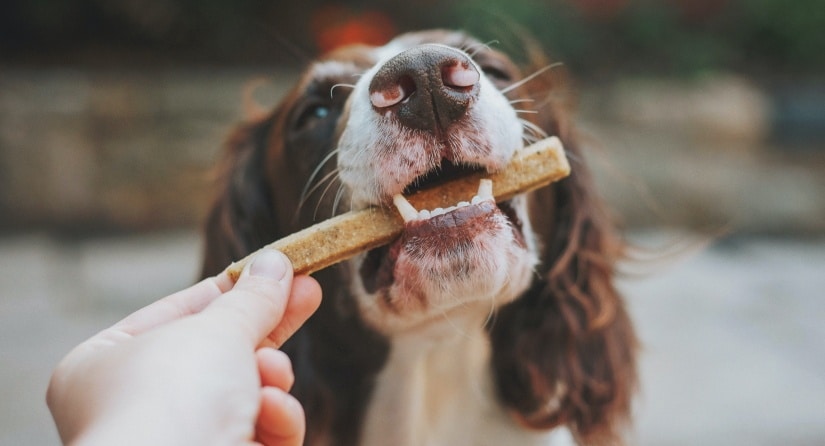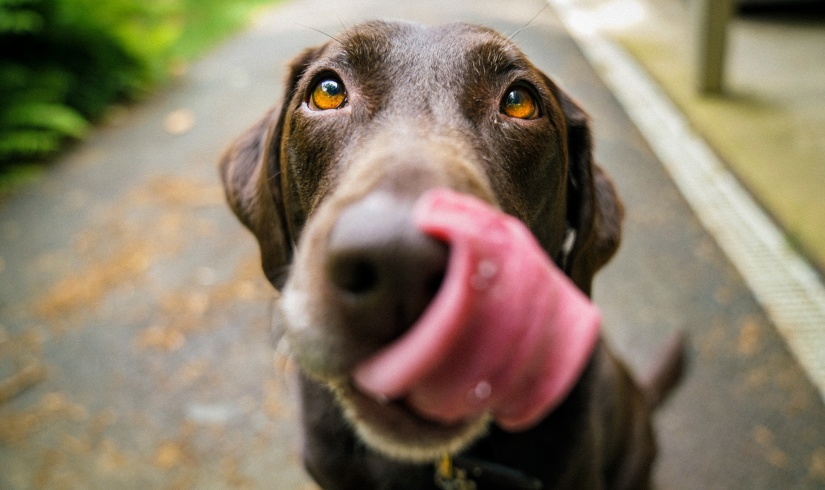No matter their breed, age or size, each dog is unique and requires a balanced diet to keep them healthy and happy. But how do you know which dog food is right? And what things do you need to look out for? We’re going to explore:
Let’s get going and start to uncover the right food for your furry friend…
There are several factors to consider when choosing dog food for your pooch. Things like their breed, age, size, weight, and any illnesses all impact what they can and can’t eat, their portion sizes, and more. It’s important to be picky because their needs can change as they age and develop, and no food is perfect for every pup.
What are Complete Dog Foods?
The AKC says, “The best dog food for your canine companion should meet his nutritional needs.” So, the best thing you can do if you’re not sure is to choose a ‘Complete’ dog food. These are foods that are considered generally nutritionally balanced and contain at least the minimum level of nutrients legally required. Plus, they usually come customised for a dog’s age and weight.
The issue with these is they don’t consider illnesses and more detailed information about your pup, like their breed. But even so, you can be sure they have all the relevant nutrients for their age if nothing else.
What to feed puppies
From when they’re born until the age of one or two, dogs are considered puppies and go through a rapid phase of growth and development. Because of this, they have unique nutritional needs that adult dog food can’t fulfil – for example, they burn a lot of energy, so they need more overall calories to support their muscle growth, and that’s what dedicated puppy food supplies.
When picking up your puppy, their breeder will likely already have them on specific food and in a feeding routine, so make sure to ask so you can feed them the same way. The reason for this is, it’s always best to slowly change their food over a week or so instead of making the change immediately as this can help avoid upset stomachs.
As for a routine, aim to give them three to four small meals a day to keep them full of energy. And make sure to portion the food out carefully if you’re giving them both wet and dry food – the product packaging should have a portion guide on it.
What to feed adult dogs

Adult dog food is very high in protein but has a more even split between carbohydrates and fibre. This is because a carb-heavy diet is suited to a growing puppy, whereas, when their bodies settle down into adulthood and finish growing, adult dogs need less energy for growth and more protein and fibre to keep their weight at a healthy level.
The key to feeding adult dogs is to remember, it’s all about maintenance. You’re not feeding their growth; you should simply be aiming to maintain their weight and health level.
Where some tend to slip up is with the treats. Dog treats are excellent training and encouraging tools, but they can be highly calorific. It might be good to explore alternative, healthier treats. Why not try feeding your dog one or two of these instead:
- Carrots are an excellent treat as they are low in calories, they keep the dog occupied for a while, and chewing can help support their dental health.
- Apples are also good as they’re full of fibre – just remove any seeds and keep the core away from your dog.
- Berries are a nice, sweet treat for your pup, and they’re high in vitamin C, but they are best in moderation.
- Watermelon is wonderfully hydrating but remove the seeds and don’t share the rind.
Raw bones are a classic dog treat that is safe to give and beneficial for their teeth and gums but avoid sharing cooked bones in case they splinter. Chicken bones should be completely avoided.
What to feed senior dogs
After the age of eight, most dogs are considered ‘seniors’ – if you go by dog years, they could be between 48 and 65 years old at this point!
No, it’s not their age that determines the food they should be eating, it’s their health. You may notice your senior dog has developed some problems as they’ve grown older such as joint issues, reduced activity levels, weight problems and maybe even illnesses like diabetes. However, they may be eight years old and the picture of health.
It’s best to ask your vet whether the swap to senior food is needed, and they can often advise on the best kind for your pooch. Senior dog food is often better suited for older, ill dogs as they tend to contain additional nutrients and supplements to support their ageing joints and health like Glucosamine, Chondroitin and additional Omega-3s.
Wet, Dry, Raw or Vegan?
There’s a lot of talk these days about the wet Vs. dry food debate and if raw diets are better, but there is no right answer. If you’re feeding your pup all the nutrients they need for their age and health, then any diet will work.
- Some think dry foods are better as they support dental health (not always true).
- Others think wet food adds more moisture and improves hydration.
- Some prefer raw diets as they are free of any additives and are more like their wolf ancestors used to eat. Though the PDSA states, “…if you choose to feed a raw diet, it’s really important to be hygienic at home…” to avoid bacterial contamination.
- Some owners are exploring vegan and vegetarian doggy diets which may seem unhealthy but aren’t always.
Each type of food has its benefits and downsides, so it’s easy to see why some owners prefer to mix up their dog’s diet to take advantage of the various benefits. Usually, this means serving wet or raw food at set mealtimes and then leaving a portioned amount of dry food out all day to prevent wastage of the wet food and give them something to graze on. With this method of feeding, you’ll need to ensure they’re getting the right portion sizes and calories.
At the end of the day, modern-day dogs are omnivores – they can eat both meat and plant-based items with no problem. All that matters is your dog’s preference and that their overall diet is nutritionally complete for them.
All about special diets

There are also any allergies and illnesses to consider as well. Some dogs are born with health issues like sensitive stomachs and allergies, so they require custom diets that are free from any unwelcome substances like grain or peas.
Many brands are now adapting to these doggy conditions and have begun providing Grain-free alternatives and gluten-free options in the market.
What foods to avoid
There are some foods you should avoid at all costs when it comes to feeding your dog, as they are poisonous. Dogs are not like humans, and they can’t digest the same things, so make sure to avoid the following toxic ingredients:
- The allium family (Garlic, Onions, Chives, etc).
- Avocado
- Cooked Bones
- Grapes and raisins
- Chocolate
- Alcohol
- Macadamia nuts and Almonds
There are a lot of other unfriendly foods as well, so make sure to do your research, ask your vet, and stick with professional pet foods and treats if you’re unsure.
How do you decide what food is right for your dog?
As mentioned, most dog food brands do age-specific and/or breed-specific food options. And they consider individual dietary needs like grain or gluten-free too. So, you can choose based on these and see how your dog does. The other option is to use a supplier that has a dog food quiz where you can customise the food by things like breed, age, weight, illness, and behaviour, though this does limit your options somewhat.
You can look at the pet food packaging as well, since the pet food industry is well regulated, and there are legal things that have to be shared with consumers. For example, you can tell if the food is decent by assessing the essential information written there, and there are some tricks to look out for:
- To name the product ‘beef’ means there should be a specific percentage of beef in there.
- To say ‘With Beef’ or ‘Beef Flavour’ usually means there is much less.
- The ingredients list should detail everything, so look out for any dietary requirements.
As always, if you’re not sure, speak to your vet for recommendations, or check out some of the breed forums for advice.
Just like humans, dogs are unique with differing tastes, metabolisms, weight, illnesses and more, so of course, they’ll need some more customised food choices. The best way forward is to try a few things, ask for advice and pay attention to your pup to see what works best for them. Before you know it, you’ll have a healthy diet and a happy dog ready to have fun for years to come.
